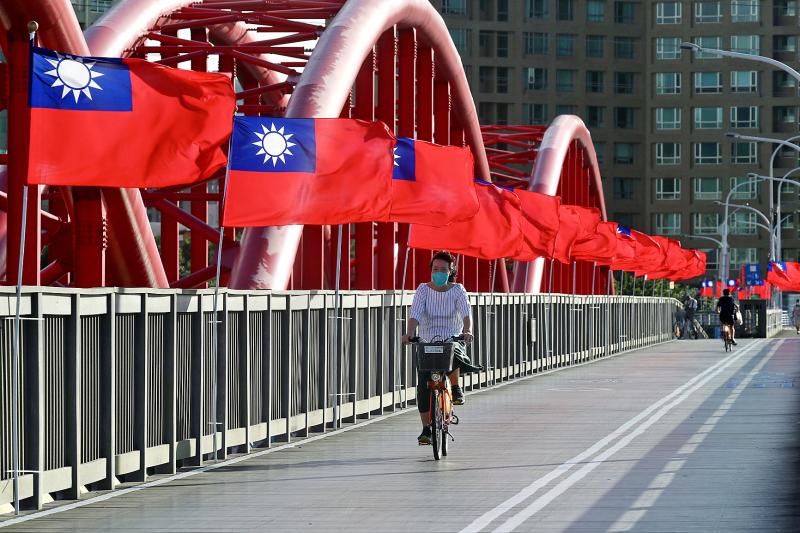Washington has confirmed to Taipei that its policy toward Taiwan remains unchanged, the Presidential Office said yesterday.
The US is to maintain its commitments to Taiwan in accordance with the Taiwan Relations Act and the “six assurances,” Presidential Office spokesman Xavier Chang (張惇涵) said in a statement.
The Presidential Office issued the remarks after US President Joe Biden — who for the first time since taking office was responding to Chinese military sorties near Taiwan — told Chinese President Xi Jinping (習近平) that the two nations should stick to the “Taiwan agreement.”

Photo: Ritchie B. Tongo, EPA-EFE
“I’ve spoken with Xi about Taiwan. We agree ... we will abide by the Taiwan agreement,” Biden told reporters at the White House after returning from a trip to Michigan when asked about China’s military maneuvers in the South China Sea.
“That’s where we are and we made it clear that I don’t think he should be doing anything other than abiding by the agreement,” he said, without specifying what agreement he was referring to.
NO CHANGE
Following Biden’s remarks about the “Taiwan agreement,” the Ministry of Foreign Affairs immediately checked with US officials in Taipei and Washington, who reassured ministry officials that US has not changed its policy toward Taiwan, ministry spokeswoman Joanne Ou (歐江安) said in a statement.
As the US Department of State’s statement on Sunday shows, the US’ policy toward Taiwan is predicated on its Taiwan Relations Act and the “six assurances,” Ou said.
The US has reiterated that its commitment to Taiwan is rock solid, and that it would continue to assist Taiwan in maintaining adequate self-defense capabilities, she added.
COMMITTED
Asked to clarify the “Taiwan agreement,” the American Institute in Taiwan (AIT) also referred to the US state department’s statement, without commenting further.
The ministry thanked the Biden administration for reiterating its commitment to Taiwan, Ou said.
In the face of Chinese military, diplomatic and economic pressure, Taiwan and the US have been maintaining close and smooth communication, she said.
The government would continue to bolster its self-defense capabilities, in a bid to defend Taiwan’s freedoms and democratic institutions, while continuing to work with the US and other like-minded partners in defending a rules-based international order, Ou added.
This month, the Chinese People’s Liberation Army (PLA) has deployed a record number of aircraft in military exercises near Taiwan, a move criticized by Taipei as a provocation and an attempt to intimidate.
Over the past five days, 150 PLA warplanes have entered the southwestern part of Taiwan’s air defense identification zone, according to the Ministry of National Defense, which has made the data available on its Web site since September last year.
BACKUP
The dispute over Taiwan was expected to be on the agenda when US National Security Adviser Jake Sullivan and top Chinese diplomat Yang Jiechi (楊潔篪) met in Zurich, Switzerland, later yesterday.
The talks are the highest-level meeting between the two nations since an acrimonious exchange in Anchorage, Alaska, in March and are the latest sign of a potential diplomatic thaw between them.
Additional reporting by Lin Chia-nan and Bloomberg

A magnitude 7.0 earthquake struck off Yilan at 11:05pm yesterday, the Central Weather Administration (CWA) said. The epicenter was located at sea, about 32.3km east of Yilan County Hall, at a depth of 72.8km, CWA data showed There were no immediate reports of damage. The intensity of the quake, which gauges the actual effect of a seismic event, measured 4 in Yilan County area on Taiwan’s seven-tier intensity scale, the data showed. It measured 4 in other parts of eastern, northern and central Taiwan as well as Tainan, and 3 in Kaohsiung and Pingtung County, and 2 in Lienchiang and Penghu counties and 1

FOREIGN INTERFERENCE: Beijing would likely intensify public opinion warfare in next year’s local elections to prevent Lai from getting re-elected, the ‘Yomiuri Shimbun’ said Internal documents from a Chinese artificial intelligence (AI) company indicated that China has been using the technology to intervene in foreign elections, including propaganda targeting Taiwan’s local elections next year and presidential elections in 2028, a Japanese newspaper reported yesterday. The Institute of National Security of Vanderbilt University obtained nearly 400 pages of documents from GoLaxy, a company with ties to the Chinese government, and found evidence that it had apparently deployed sophisticated, AI-driven propaganda campaigns in Hong Kong and Taiwan to shape public opinion, the Yomiuri Shimbun reported. GoLaxy provides insights, situation analysis and public opinion-shaping technology by conducting network surveillance

‘POLITICAL GAME’: DPP lawmakers said the motion would not meet the legislative threshold needed, and accused the KMT and the TPP of trivializing the Constitution The Legislative Yuan yesterday approved a motion to initiate impeachment proceedings against President William Lai (賴清德), saying he had undermined Taiwan’s constitutional order and democracy. The motion was approved 61-50 by lawmakers from the main opposition Chinese Nationalist Party (KMT) and the smaller Taiwan People’s Party (TPP), who together hold a legislative majority. Under the motion, a roll call vote for impeachment would be held on May 19 next year, after various hearings are held and Lai is given the chance to defend himself. The move came after Lai on Monday last week did not promulgate an amendment passed by the legislature that

AFTERMATH: The Taipei City Government said it received 39 minor incident reports including gas leaks, water leaks and outages, and a damaged traffic signal A magnitude 7.0 earthquake struck off Taiwan’s northeastern coast late on Saturday, producing only two major aftershocks as of yesterday noon, the Central Weather Administration (CWA) said. The limited aftershocks contrast with last year’s major earthquake in Hualien County, as Saturday’s earthquake occurred at a greater depth in a subduction zone. Saturday’s earthquake struck at 11:05pm, with its hypocenter about 32.3km east of Yilan County Hall, at a depth of 72.8km. Shaking was felt in 17 administrative regions north of Tainan and in eastern Taiwan, reaching intensity level 4 on Taiwan’s seven-tier seismic scale, the CWA said. In Hualien, the